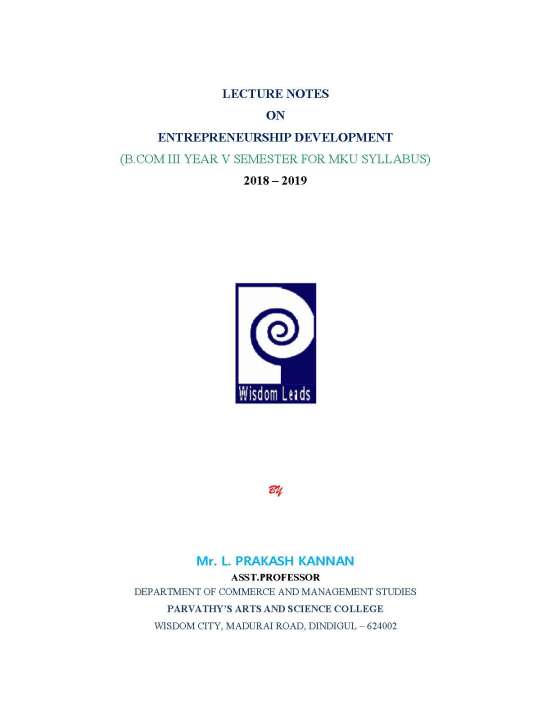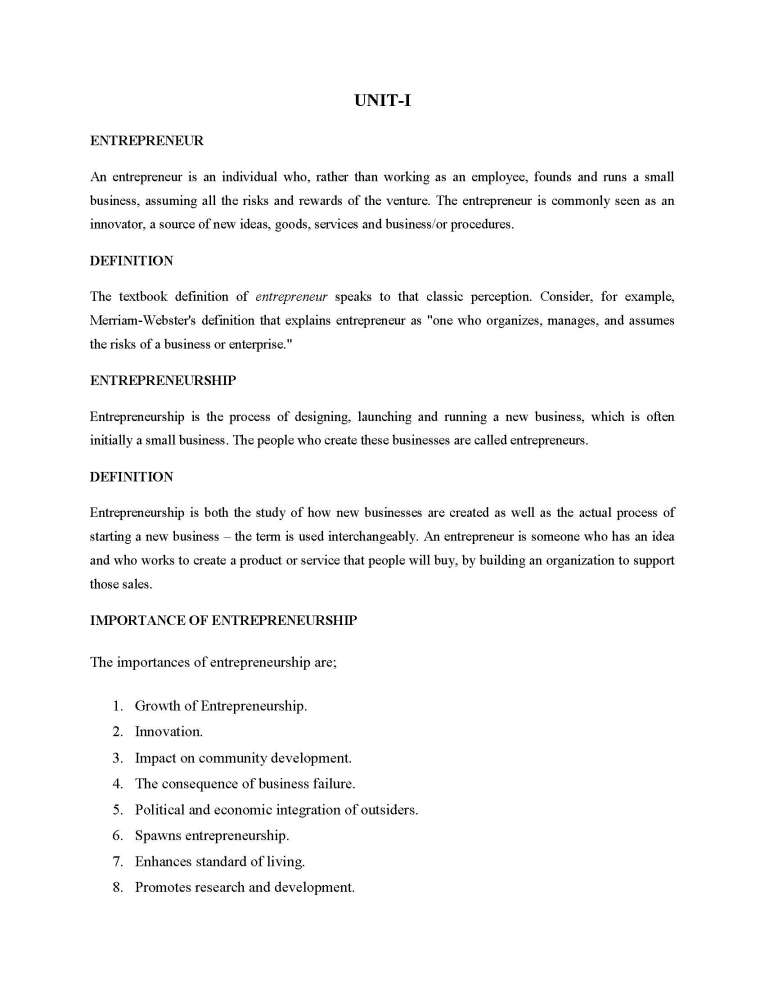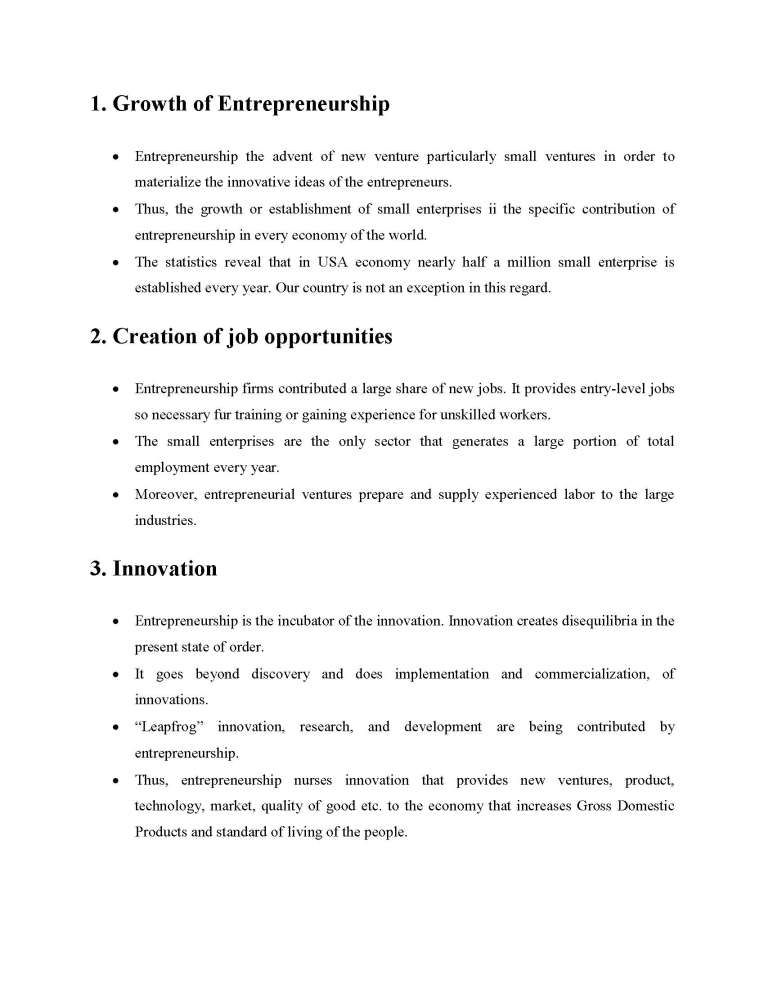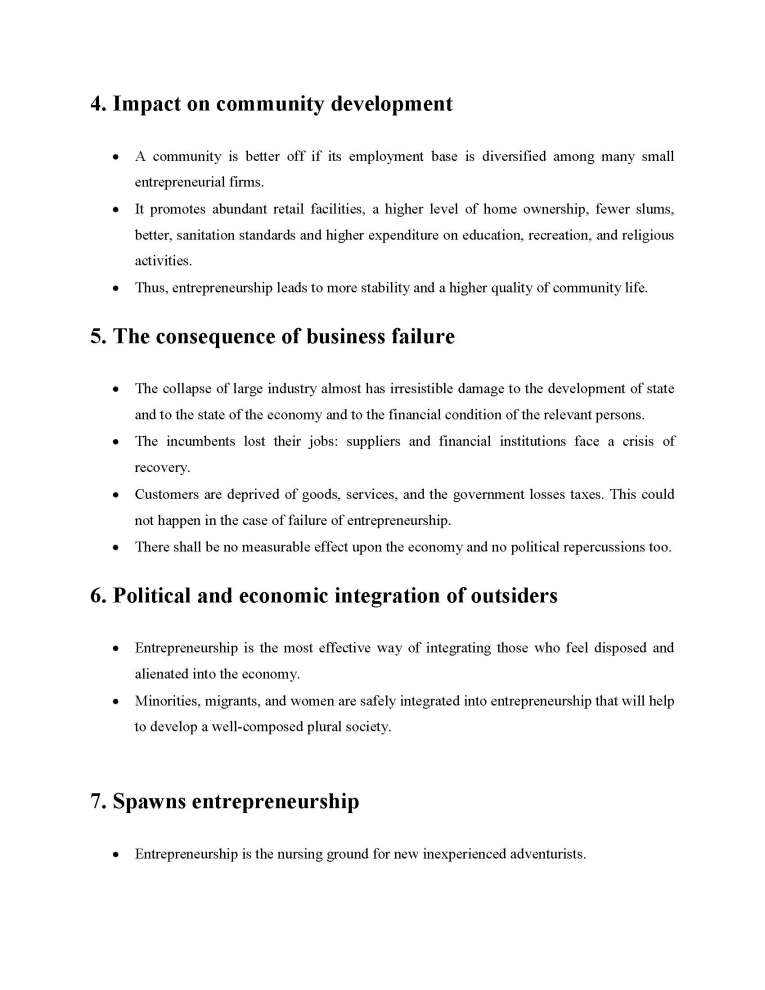|
#1
| |||
| |||
|
Will you please provide me the Madras University B.Com Syllabus? The syllabus of Entrepreneurship Development of B.Com of Madras University is as follows: ENTREPRENEURIAL DEVELOPMENT AND MANAGEMENT OF SMALL BUSINESS Unit - I Concept of Entrepreneurship - Meaning - Types - Qualities of an Entrepreneur - Classification of Entrepreneurs - Factors influencing Entrepreneurship - Functions of Entrepreneurs. Unit - II : Entrepreneurial Development - Agencies Commercial Banks - District Industries Centre - National Small Industries Corporation - Small Industries. Development Organisation - Small Industries Service Institute. All India Financial Institutions - IDBI - FCI - ICICI – IRDBI. Unit - III : Project Management Business idea generation techniques - Identification of Business opportunities - Feasibility study - Marketing, Finance, Technology & Legal Formalities - Preparation of Project Report - Tools of Appraisal. Unit - IV Entrepreneurial Development Programmes (EDP) - Role, relevance, and achievements - Role of Government in organizing EDPs - Critical evaluation. Unit - V : Economic development and entrepreneurial growth Role of entrepreneur in economic growth - Strategic approaches in the changing Economic scenario for small scale Entrepreneurs - Networking, Niche play, Geographic concentration, Franchising / Dealership - Development of Women Entrepreneurship. Unit - VI Importance of small scale industries - Definition - Contribution to national economy - Classification of small scale units - Cottage, tiny, village, ancillary, KVI Cent. Unit - VII Industrial Estates - Concept, infrastructure for small business units. Unit - VII Procedures in setting of small scale units – Licensing - Registration - Financing - Working capital - Financing institutions. Unit - VIII Institution for the development of small scale industries - NSIC, SIDCO, SIDO, SISI, Development Commissioner - TANSI, SIDCO, DIC, Directorate of Industries and Commerce. Unit - X Concessions, rebates, incentives and subsidies to small scale units - Prime Minister’s Rojkar Yojna (PMPY) EPZ and 100% EOUs, sickness of small scale units and revival. Unit - I Meaning and scope of Accounting, Basic Accounting Concepts and Conventions -Objectives of Accounting - Accounting Transactions - Double Entry Book keeping - Journal, Ledger, Preparation of Trial Balance - Preparation of Cash Book. Unit - II Preparation of Final Accounts of a Sole Trading Concern - Adjustments - Closing Stock, Outstanding and Prepaid items, Depreciation, Provision for Bad Debts, Provision for Discount on Debtors, Interest on Capital and Drawings - Preparation of Receipts and Payments Account, Income & Expenditure Account and Balance Sheet of Non Trading Organizations (simple problems). Unit - III Classification of errors - Rectification of errors - Preparation of Suspense Account. Bank Reconciliation Statement (Only simple problems). Unit - IV Depreciation - Meaning, Causes, Types - Straight Line Method - Written Down Value Method (Change in Method excluded) - Insurance Claims - Average Clause (Loss of stock only). Unit - V Single Entry - Meaning, Features, Defects, Differences between Single Entry and Double Entry System – Statement of Affairs Method - Conversion Method (Only simple problems). Unit - VI Branch Accounts - Dependent branches - Stock and debtors system - Distinction between wholesale profit and retail profit - Independent branch (foreign branches excluded). Unit - VII Departmental Accounts - Basis for allocation of expenses - Inter departmental transfer at cost or selling price - Treatment of expenses which cannot be allocated. Unit - VIII Hire purchase and installment - Default and repossession - Hire purchase trading account. Installment purchase system. Unit - IX Admission of a partner - Retirement of a partner - Death of a partner. Unit - X Dissolution of a partnership - Insolvency of a partner (Application of Indian Partnership Act, 1932) - Insolvency of all partners - Gradual realisation of assets and piecemeal distribution. REFERENCE BOOKS 1. R.L. Gupta & V.K. Gupta - Advanced Accounting, Sultan Chand, New Delhi. 2. T.S. Reddy & Murthy - Financial Accounting, Margham Publications, Chennai. 3. Shukla & Grewal - Advanced Accounting, S. Chand, New Delhi. 4. Jain & Narang - Financial Accounting 5. P.C. Tulsian - Financial Accounting 6. S. Parthasarathy and A. Jaffarulla, Kalyani Publishers, Financial Accounting. 7. R.L. Gupta & Radhaswamy - Advanced Accounting, Volume 1. PAPER II - BUSINESS ECONOMICS Unit I The scope and Method of Business Economics – Risk Uncertainty and probability analysis – Approach to managerial decision making theory of firm. Uncertainty and probability analysis - Approach to managerial decision making theory of firm. - Unit II Demand Analysis - basic concept and tools of analysis for demand forecasting - use of business indicators, demand for consumer durable and capital goods. Unit III Concepts of resource allocation , cost analysis, Break- even analysis, short run and long run cost functions, Production functions, cost-price output relations - capital investment analysis - Economies of size and capacity utilisation - input -output analysis - market structure - pricing and output - general equilibrium. Unit IV Product policy - sales promotion and market strategy - advertising rates - advertising budgeting Unit V Pricing objectives - pricing methods and approaches - product line pricing -differential pricing. Unit VI Capital budgeting - Capital Management and financial policy. Unit VII Monopoly policy - Restrictive agreements. Unit VIII Price discrimination - Measurement of Economics Concentration policy against monopoly and restrictive trade practices. Unit IX Problems of Economic aggregates - National Income, and Product Saving, Consumption, Investment, the theory of income determination. Unit X Canons of Taxation. BOOKS RECOMMENDED 1. S. Sankaran - Managerial Economics, Margham Publication, 2002, 2. I.C. Dhingra - Indian Economy, Sultan Chand 2000. 3. Mankar and Pillai - Business and Managerial Economics, Himalaya, 2000. 4. Mote Paul and Gupta - Managerial Economics, Tata Mc Graw - Hill, 2000. 5. Business Economics - P.L. Mehta 6. Business Economics - Francis Cherunilam 7. Economics for Business - Peter Mitchelson and Andrew Mann 8. Business Economics - C.M. Chaudhary 9. The essence of Business Economics - Nellis and Parker 10. Business Economics - Ferguson P.R. and Rothschild. R and Ferguson G.J. 11. Business Economics - H.L. Ahuja 12. International Trade and Export Management – Francis Cherunilam 13. International Economics - K.R. Gupta 14. International Economics (Theory and Policy) – Paul R. Krugman and Maurice Obstfeld. 15. International Economics - Robert J. Carbaugh. 16. International Economics - H.G. Mannur Madras University B.Com Syllabus You are looking for the Madras University B.Com Syllabus, here I am providing: B.Com: Duration: 3 Years Eligibility: The applicant should have pass 10+2 with good academic record from any recognized School or Board. 1st SEM: Part – I Language Paper – I Part – II English Paper – I Core 1 : Financial Accounting Core 2 : Accounting Standards Core 3: Customer Relationship Management Core 4 : Business Economics Part – IV 1. (a) Not studied Tamil upto xii std. – shall take Tamil Comprising of two courses (level VI std.) (b) Studied Tamil upto xii std – taken Non-Tamil under Part – I shall take advance Tamil comprising of two courses. (c) Others who do not comes under a & b can choose non-major elective comprising of two courses. Internship – I (Two weeks) 2nd SEM: Part – I Language Paper – II Part – II English Paper – II Core 5: Financial Accounting – II Core 6 : Insurance and risk management Core 7: Services Marketing Core 8 : International Trade Part – IV 1. (a) Not studied Tamil upto XII std. – shall take Tamil Comprising of two courses (level VI std.) (b) Studied Tamil upto XII std – taken Non-Tamil under Part – I shall take advance Tamil comprising of two courses. (c) Others who do not comes under a & b can choose non-major elective comprising of two courses. For the detailed syllabus, here is attachment: Last edited by Aakashd; December 23rd, 2019 at 10:03 PM. |
|
#3
| |||
| |||
|
University of Madras is a public state university in Chennai, Tamil Nadu, India. Established in 1857, it is one of the oldest universities in India after University of Calcutta. Please find the below attached file for the B.Com Entrepreneurship Development paper of Madras University: B.Com Entrepreneurship Development paper of Madras University Also below I am providing you the B.Com Entrepreneurship Development notes: B.Com Entrepreneurship Development Notes     Course syllabus: 1. Importance of entrepreneurship and its relevance in career growth. No. of Hours: (3) Entrepreneur, Entrepreneurship and Enterprise. Concept and role development Characteristics of Entrepreneurs Developing Entrepreneurial Competencies. 2. Types of Enterprises and Ownership No. of Hours: (3) Manufacturing, Service and Franchise. Large, medium, SSI, tiny and Cottage industries. Limited, Public Limited, Private Limited, Partnership, Sole Proprietorship. Advantages and disadvantages of types of ownership. Employment, Self employment and Entrepreneurship. 3. Financial Management - Importance and Techniques No. of Hours: (2) Management of Working Capital, Reinforcement of the Concept of Working Capital. Factors to be controlled in managing working capital - Tools and Techniques 4. Books of Account No. of Hours: (2) Importance of accounting assessment. Different books and its relevance. Support stationery and its use. Operating mechanism. 5. Financial Statements No. of Hours: (2) Importance and its interpretation Profit and Loss account Balance Sheet Cash flow/funds flow 6. Marketing Management No. of Hours: (3) Marketing for small business Strategies for sales promotion - tools and techniques for Sales promotion, pricing policy and its implications on sales. 7. Export Marketing No. of Hours: (2) Understanding the International Business environment. Procedures and formalities. Do's and Don'ts for exports 8. Inventory Control and Quality Management No. of Hours: (3) Defining Quality and its concept Aspects of quality management ISO 9000 Certification Total Quality Management (TQM) 9. Enterprise Establishment and Credit Disbursement facilities. No. of Hours: (3) Financial support from financial institutions Procedures for applications Disbursement procedure Do's and Don'ts 10. Legal Complications No. of Hours: (2) Income Tax Sales Tax Excise Labour laws, factory act, pollution control act etc. Contact: Madras University Navalar Nagar, Chepauk, Triplicane Chennai, Tamil Nadu 600005 Phone: 044 2539 9422
__________________ Answered By StudyChaCha Member |